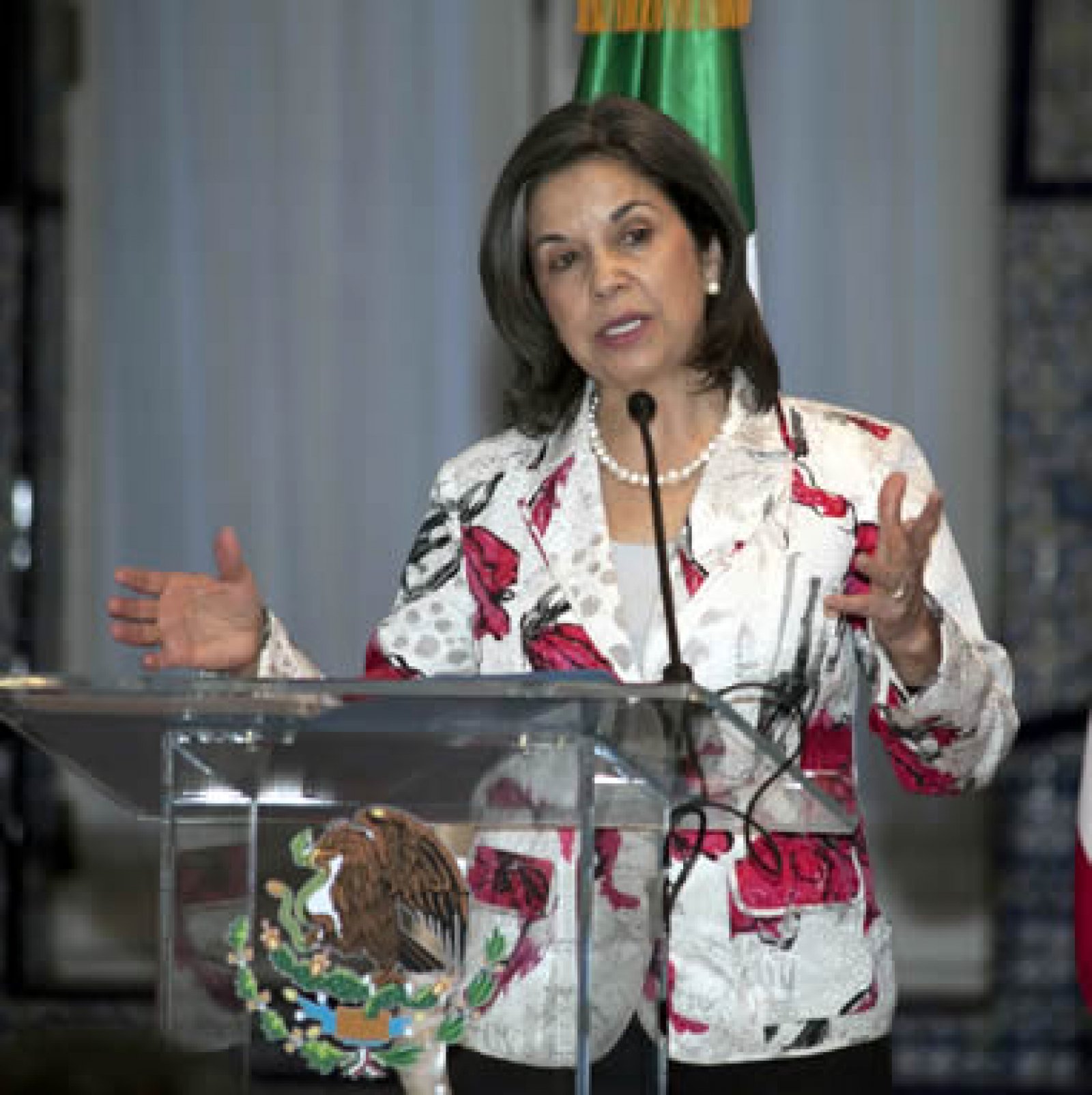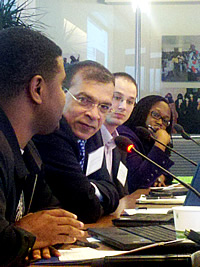
SHARE
ISSUES
For the first time, a broad and diverse gathering of civil society representatives from 38 countries convened in Washington this week and established a shared commitment to advocate for strong, open parliaments that embody citizens' voices.
The conference, which ran from April 30 to May 2, provided an opportunity for parliamentary monitoring organizations (PMOs) from all regions of the world to share their experiences and good practices on a host of topics, from monitoring political finance to advocating for greater transparency of parliamentary information. The conference was co-hosted by the Latin American Network for Legislative Transparency, the Sunlight Foundation and NDI.
U.S. Under Secretary of State Maria Otero, keynote speaker at the conference, observed that, “Parliaments or legislatures are, in a sense, the most direct line that government has to the governed, especially when it comes to communication and to representation of the people’s wants and needs. The question that brings us here tonight — and to this great conference — is how can we build on those conduits of communication — between elected officials and citizens, to increase openness, transparency, and accountability in government.” She said the conference was “an important initiative and is an important undertaking for those of us who strive for more transparent, accountable and open governments around the world.”
The PMOs at the conference agreed to continue to work together in a number of concrete areas, including a shared declaration of principles on parliamentary transparency. The draft document reviewed by the delegates recognized that parliamentary information belongs to the public and can be used by citizens most effectively only if it is provided within a broader culture of transparency and openness. The draft specifies categories of parliamentary information that should be made public and provides guidance on how to make this information more easily accessible to citizens.
In addition, the draft document provides guidance on enabling improved electronic, online access and analysis of parliamentary information. Information released online in structured open data formats, as proposed in the draft principles, allows citizens and civil society groups to analyze and reuse parliamentary information using the full range of technology tools available.
The PMOs expressed broad support for the parliamentary transparency declaration and committed to finalizing the text within the next two months, after additional consultations and after incorporating input received at the conference. The working document discussed at the conference is available here.
The PMOs also agreed to continue their networking to advance shared interests and objectives through greater online collaboration and through periodic meetings. Several concrete initiatives were discussed to increase collaboration on technology used by PMOs, including initiatives led by mySociety, which runs many of the United Kingdom’s best known democracy websites, and by an informal technology working group coordinated by Transparência Hacker, a Brazilian network that includes parliamentarians and parliamentary staffers.
Additionally, conference participants agreed to use their informal network of PMOs to share information about parliamentary transparency, an effort being coordinated initially by PRS Legislative Research from India. Building on the experiences and benefits of regional collaboration demonstrated by the Latin American Network on Legislative Transparency, PMOs from both Central and Eastern Europe, from the Middle East and North Africa, and from Africa indicated their desire to continue closer dialogue and collaboration among PMOs within their respective regions.
 Parliamentary monitoring organization representatives from Kenya, Bangladesh and Slovakia lead a panel discussion at the conference. Photo by Andrew Mandelbaum
Parliamentary monitoring organization representatives from Kenya, Bangladesh and Slovakia lead a panel discussion at the conference. Photo by Andrew MandelbaumA host of other possible initiatives were discussed — from exchanging staff among PMOs and providing technical support to new parliamentary monitoring organizations, to supporting parliamentary monitoring organizations under threat. The conference also assessed possible opportunities to advance parliamentary openness and transparency by building on the success of the Open Government Partnership, a multilateral initiative chaired by Brazil, which recently assembled 1,200 delegates from over 73 countries for its first annual meeting.
The PMOs also indicated a particular desire to increase constructive engagement and dialogue with parliaments and parliamentary associations to help decrease the gap between citizens and their elected representatives. At the conference, Anders B. Johnsson, the secretary general of the Inter-Parliamentary Union (IPU), reviewed efforts by the IPU to support parliamentary development and welcomed the possibility of greater cooperation between parliamentary bodies and the growing community of parliamentary monitoring organizations. PMOs also explored options for future cooperation with the Global Centre for ICT in Parliament, an initiative launched by the United Nations Department of Economic and Social Affairs in partnership with the IPU, which works to strengthen parliaments through the use of technology.
As Mónica Pachón, a conference participant and the chair of Congreso Visible from Colombia has noted, “In many countries, parliaments are not exactly popular. If the discourse of PMOs doesn’t question the negative image that people sometimes have about Congress — then we are not doing much. If citizens don’t realize that Congress is a very important branch for a political system to work, then we’re not improving the quality of our democracies.”
The gathering was supported by the Omidyar Network, the Open Society Foundation, the National Endowment for Democracy, the World Bank Institute and the Embassy of Mexico to the United States, whose ambassador, Arturo Sarukhan, presented at the conference and hosted the conference dinner with U.S Under Secretary of State Otero.
Worldwide, there are more than 190 parliamentary monitoring organizations (PMOs) observing more than 80 national parliaments, according to a recent publication by the NDI and the World Bank Institute, Strengthening Parliamentary Accountability, Citizen Engagement and Access to Information: A Global Survey of Parliamentary Monitoring Organizations.
Read more:
- Read the draft declaration»
- Study explores efforts of citizen organizations to monitor parliaments»
- Political Process Monitoring: Activist Tools and Techniques»
Published May 2, 2012


